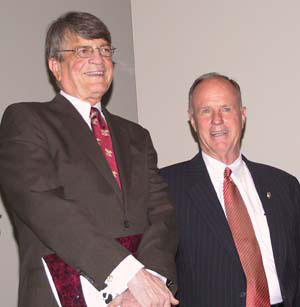Wilson Discusses 'Charlie Wilson's War'
 |
| Former Texas congressman Charlie Wilson |
“It was a scary time, and while most have forgotten,
it was real, and it was terrifying,” said former Texas
congressman Charlie Wilson about the Soviet Union during the
Cold War.
Filled with anecdotes about his fondness for Sam Houston State
University, Wilson, who attended SHSU in 1950-51, spoke to
a packed Lowman Student Center Theatre on Wednesday morning
as part of the Distinguished Lecturer Series.
“I was born and grew up in Trinity in the 1930s and
1940s and came here in 1950. Huntsville was sort of a cultural
Mecca for people who lived in Trinity,” Wilson said.
“Sam Houston was a very exciting place for me in 1950.
I was 16 or 17, and I was interested primarily in history,”
he said. We had the Country Campus that was a big thing for
Sam Houston for all of the boys coming back from the war and
their new wives to live, so they could go to school on the
GI bill.
“I’d be in history class with those boys and I
just drove them all crazy; making them tell me war stories
over and over,” he said.
His speech, “The Red Army’s Last Battle and the
Collapse of the Soviet Empire,” revolved around the
book written about him, "Charlie Wilson's War,"
and Congress’ helping of Afghanistan during the 1980s
against the Soviet Union attack.
“This all-powerful, indomitable, irresistible empire
(the Soviet Union) invaded a small country bordering on its
south made up of tribesmen and shepherds, people who had never
seen a toilet, people who were illiterate, people who were
unarmed,” he said, “but unfortunately for the
Red Army, people who were born without fear, with good eyesight
and with a steady trigger finger.”
After holding out for almost a year, the war, “truly
a battle of flesh and blood against iron and steel,”
began to draw interest from the United States Congress, Wilson
said.
“We became very interested from the standpoint of the
interests of the United States, as well as from the standpoint
of great sympathy for these mountain people,” he said.
“I became convinced when we were getting reports of
the Russians losing officers to knives and stones in the city
of Kabul and other cities of Afghanistan that the Russians
had bitten off more they had intended to chew. So we began
to help them, and we began to help them significantly.”
 |
| Wilson with SHSU president James F.
Gaertner |
Aid came in the form of billions of dollars channeled into
the Central Intelligence Agency, and in 1980, President Ronald
Reagan made the “enormously courageous decision”
to furnish the Afghans with Stinger missiles to repel the
Russian HIND helicopters, which had been specifically designed
to withstand firing from the heaviest Afghan bullet, according
to Wilson.
On September 26, 1986, three of these helicopters were shot
down, the first of the war, and after that, the Soviets lost
one or two per day for the rest of the war, which was three
years.
“The idea that the Red Army, which had terrified us
for 50 years, might actually be defeated by a rag-tag group
of mountain men was so exciting that we began to pour everything
we could into Afghanistan,” Wilson said.
The result of those actions also led to the end of the Cold
War.
“The Soviet Army had never lost a battle before September
of 1986, and they never won one after that,” Wilson
said. “Not only did they lose the war, but the Red Army
marched out of Afghanistan in the face of God and everybody
on Feb. 15, 1989.
“The prestige of the Red Army was broken, the heart
of the Red Army was broken, the morale of the Red Army was
broken and more than anything else, the influence in the Kremlin
of the Red Army was broken. And the Army was then unable to
persuade the Kremlin that there was a military opportunity
in (other areas).”
In answer to questions from the audience, Wilson said the
United States is continuing to do the right thing in Afghanistan.
Iraq, however, is a different matter.
“If I had been president I would not have gone to Iraq,”
he said. “Iraq did not threaten the United States; Iraq
had no weapons of mass destruction; and we have no critical
evidence that Iraq had any relationship with Al Qaeda.
“And I’ll be damned if I know how to get us out.”
—End—
SHSU Media Contact: Jennifer
Gauntt
April 14, 2004
Please send comments, corrections, news tips to Today@Sam.edu.
|


